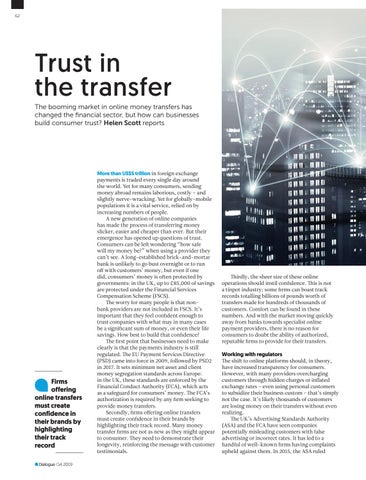62
Trust in the transfer The booming market in online money transfers has changed the financial sector, but how can businesses build consumer trust? Helen Scott reports
Firms offering online transfers must create confidence in their brands by highlighting their track record Dialogue Q4 2019
More than US$5 trillion in foreign exchange payments is traded every single day around the world. Yet for many consumers, sending money abroad remains laborious, costly – and slightly nerve-wracking. Yet for globally-mobile populations it is a vital service, relied on by increasing numbers of people. A new generation of online companies has made the process of transferring money slicker, easier and cheaper than ever. But their emergence has opened up questions of trust. Consumers can be left wondering “how safe will my money be?” when using a provider they can’t see. A long-established brick-and-mortar bank is unlikely to go bust overnight or to run off with customers’ money, but even if one did, consumers’ money is often protected by governments: in the UK, up to £85,000 of savings are protected under the Financial Services Compensation Scheme (FSCS). The worry for many people is that nonbank providers are not included in FSCS. It’s important that they feel confident enough to trust companies with what may in many cases be a significant sum of money, or even their life savings. How best to build that confidence? The first point that businesses need to make clearly is that the payments industry is still regulated. The EU Payment Services Directive (PSD) came into force in 2009, followed by PSD2 in 2017. It sets minimum net asset and client money segregation standards across Europe: in the UK, these standards are enforced by the Financial Conduct Authority (FCA), which acts as a safeguard for consumers’ money. The FCA’s authorization is required by any firm seeking to provide money transfers. Secondly, firms offering online transfers must create confidence in their brands by highlighting their track record. Many money transfer firms are not as new as they might appear to consumer. They need to demonstrate their longevity, reinforcing the message with customer testimonials.
Thirdly, the sheer size of these online operations should instil confidence. This is not a tinpot industry; some firms can boast track records totalling billions of pounds worth of transfers made for hundreds of thousands of customers. Comfort can be found in these numbers. And with the market moving quickly away from banks towards specialist online payment providers, there is no reason for consumers to doubt the ability of authorized, reputable firms to provide for their transfers.
Working with regulators
The shift to online platforms should, in theory, have increased transparency for consumers. However, with many providers overcharging customers through hidden charges or inflated exchange rates – even using personal customers to subsidize their business custom – that’s simply not the case. It’s likely thousands of customers are losing money on their transfers without even realizing. The UK’s Advertising Standards Authority (ASA) and the FCA have seen companies potentially misleading customers with false advertising or incorrect rates. It has led to a handful of well-known firms having complaints upheld against them. In 2015, the ASA ruled
